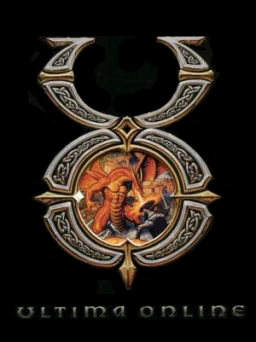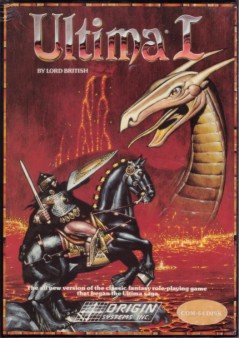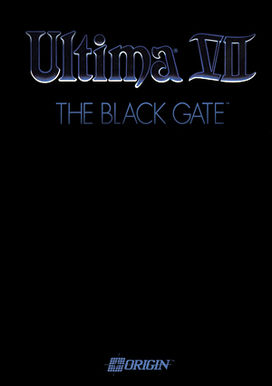
Ultima is a series of open world fantasy role-playing video games from Origin Systems, created by Richard Garriott. Electronic Arts has owned the brand since 1992. The series had sold over 2 million copies by 1997.

Ultima Online (UO) is a fantasy massively multiplayer online role-playing game (MMORPG) released on September 24, 1997 by Origin Systems.

Richard Allen Garriott is a British-born American video game developer, entrepreneur and private astronaut.

Looking Glass Studios, Inc. was an American video game developer based in Cambridge, Massachusetts. The company was founded by Paul Neurath with Ned Lerner as Blue Sky Productions in 1990, and merged with Lerner's Lerner Research in 1992 to become LookingGlass Technologies. Between 1997 and 1999, the company was part of Intermetrics and was renamed Looking Glass Studios. Following financial issues at Looking Glass, the studio shut down in May 2000.
Chuck Bueche is a video game programmer best known for co-founding Origin Systems and his involvement with the Ultima video game series.
Andy Hollis is an American video game designer, programmer and producer, mainly known for his flight simulators. He was one of the founding members of MicroProse.

Destination Games was an American computer game development company created in April 2000 by Richard Garriott, Robert Garriott and Starr Long, following their departure from Origin Systems.

NCSoft Corporation is a South Korean video game developer and publisher headquartered in Pangyo, Seongnam, South Korea, primarily known for the distribution of massively multiplayer online role-playing games such as Lineage and Guild Wars.
Scott Jennings, also known as Lum the Mad, is an American commentator on MMORPG games. He is best known for creating a website, The Rantings of Lum The Mad, a pioneer blog, which existed from 1998 to 2001, when Jennings was hired by MMO developer Mythic Entertainment, where he remained until 2006.

Harvey Smith is an American video game designer and writer, working at Arkane Studios.

Ultima, later known as Ultima I: The First Age of Darkness or simply Ultima I, is the first game in the Ultima series of role-playing video games created by Richard Garriott, originally released for the Apple II. It was first published in the United States by California Pacific Computer Company, which registered a copyright for the game on September 2, 1980 and officially released it in June 1981. Since its release, the game has been completely re-coded and ported to many different platforms. The 1986 re-code of Ultima is the most commonly known and available version of the game.

Ultima VII: The Black Gate is the seventh installment of the Ultima series of role-playing video games, released in April 1992. In it, the player returns as The Avatar, a would-be paragon of moral virtue who faces down many dangers and deceptions in order to cleanse the medieval fantasy world of Britannia of assorted plots and schemes, monster infestations, and the undermining of crown authority.

Ultima IX: Ascension is the ninth and final part of the main series of the role-playing video game series Ultima. Developed by Origin Systems and published by Electronic Arts, Ultima IX was released in 1999 for Microsoft Windows after years in development hell. Following the Avatar's escape from Pagan, he is transported back to Britannia for one final battle with the Guardian, who is increasingly ruining the physical and moral fabric of that land by the use of eight columns. The Avatar must fight his way to the runes of virtue found in each of the columns, and cleanse them in the shrines of Virtue, then face off against the Guardian himself.

Jon Van Caneghem is an American video game director, designer and producer. He is best known for launching development studio New World Computing in 1983, making his design debut in 1986 with Might and Magic Book One: The Secret of the Inner Sanctum. During the company's 20-year lifespan, Van Caneghem was involved in the creation and direction of several franchises, including the Might and Magic role-playing series and the spin-off Heroes of Might and Magic and King's Bounty strategy series.
Robert K. Garriott is an American video game industry figure and entrepreneur. He co-founded Origin Systems and Destination Games with his brother, Richard Garriott, and was the CEO of NCsoft-North America until 2008. He is the second-eldest son of NASA astronaut Owen K. Garriott.

Jeffrey Anderson is currently serving as the founder and managing director of Kickstand, LCC. Kickstand is a boutique corporate advisory firm that offers professional guidance and consulting support to digital gaming, media and technology companies. In this role, Anderson provides seed and venture capital as well as board management, product strategy, and marketing support.

Portalarium, Inc. was a video game developer based in Austin, Texas that was formed in September 2009 by Richard Garriott, together with his longtime game industry partners, Dallas Snell and Fred Schmidt. Portalarium marks Richard Garriott's first return to the video game industry since the release of his 2007 title Tabula Rasa. The name "Portalarium," as well as the company's motto, "We take you there," are intended as a continuity and reference to Garriott's prior two companies' names and respective mottoes; Origin Systems, "We Create Worlds," and Destination Games, "We have arrived."
Denis Loubet is an artist who has worked on several pen-and-paper role-playing games and video games, including the MMORPG Ashen Empires.

Starr McAuley Long is an American game developer, a long time collaborator with Richard Garriott at the companies Origin Systems (1992–2000), Destination Games (2000–2008), and Portalarium (2013–present). In 1997, Long was the original director of the early graphical multiplayer game Ultima Online, and from 2008–2013 he was executive producer at The Walt Disney Company, where he created and managed several educational games and apps for Club Penguin and the Disney Connected Learning platform. In early 2008, he was listed as one of the Top 20 Most Influential People in the MMO industry. In 2013, he again partnered with Garriott at Portalarium, where they began working on a new game Shroud of the Avatar.
















